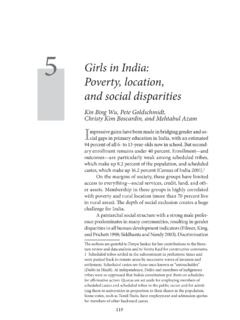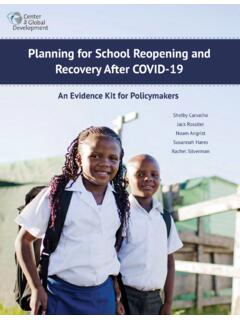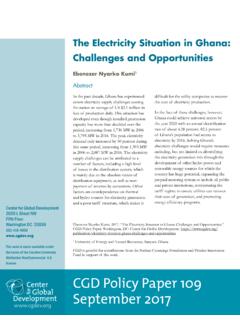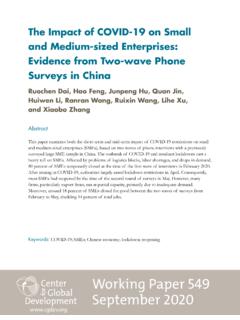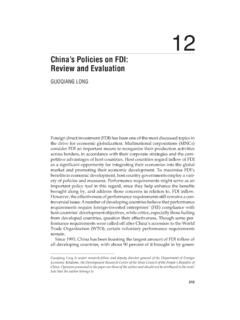Transcription of The Gitanjali Cooperative: A Social Enterprise in the Making
1 The Gitanjali cooperative : A Social Enterprise in the MakingMayra Buvinic, Tanvi Jaluka, and Megan O DonnellCGD Brief September 2017 This brief is based on a case study that draws on interviews with key informants in SEWA, Gitanjali , WEConnect International, and Accenture; on questionnaire responses from eight Gitanjali members; and on Enterprise business records provided by the full case study at 1995 India s Self-Employed Women s Association (SEWA) organized women waste pickers in Ahmedabad into a cooperative to improve their working conditions and livelihoods. When the waste recycling industry collapsed eight years later, eroding waste pickers already vulnerable income, the cooperative began to manufacture stationery products from recycled waste.
2 Over time, this informal arrangement evolved into Gitanjali a women-owned and -run Social Enterprise . With support from key partners, Gitanjali has generated Social value, providing its members with safe and dignified work while increasing their earnings. While Gitanjali faces challenges in becoming a fully self-sufficient Social Enterprise , its experience offers insights for other initiatives seeking to provide opportunities for women to transition from informal to formal s originsIn urban India, more women than men work as waste pickers ( percent of women and percent of men in urban informal employment). Waste picking is a highly vul-nerable and risky form of informal employ-ment, with variable and low pay, limited access to Social protection, no labor rights, and a lack of organization and representa-tion.
3 There is no easy path to transition from waste picking to more decent, better-paid employment. In 2008 the waste recycling industry crashed internationally a direct conse-quence of the global financial crisis. Scrap prices dropped drastically by almost half, compounding waste pickers problems. In Ahmedabad, waste pickers incomes shrank, and the city s decision to privatize door-to-door waste collection further dete-riorated their earning options. In response, Gitanjali a cooperative of women waste pickers organized by In-dia s Self-Employed Women s Association (SEWA) in 1995 created a production unit to manufacture value-added products, specifically stationery material, from recy-cled waste.
4 The partnersGitanjali s transition into a women-owned and -managed collective Social Enterprise has been shaped by SEWA s vision and ser-vices, as well as by external partnerships. SEWA, the first and largest women s trade union in the world, was founded in Ahmed-abad in 1972 to organize informal work-ers, address their occupational concerns, and provide a variety of member services, including financial services (savings ac-counts and insurance). Gitanjali shares the main hallmark of all SEWA initiatives: the belief that full employment and economic self-reliance form the core of women s empowerment. But unlike other SEWA groups, Gitanjali s members (known as sisters ) work in a factory setting rather than individually from their homes.
5 Gitanjali established robust partnerships with WEConnect International, a global network that connects women-owned businesses to qualified buyers around the world. WeConnect, in turn, connected Gitanjali to Accenture, a global man-agement consulting company with offices across India. Accenture incorporated Gitanjali into its corporate Social responsibility (CSR) markets and helped it obtain corporate customers, with Staples as the main buyer. These partnerships were sup-ported by a one-time grant from the World Bank to help Gitanjali access new markets and by pro bono technical guidance from Gopi Stationery, a local stationery company in Gitanjali s business functionsToday, the group of 50 sisters collectively owns and manages the cooperative , producing a range of stationery products from fully recycled paper for large multinational corporations, including Staples, IBM, and Goldman Sachs.
6 Before they join Gitanjali , most sisters have limited education and no formal training or experience in establishing or running a formal business. SEWA provides leadership and skills training, and assists with creating candidate screening procedures. Sis-ters must pass dexterity tests, which effectively elimi-nates all but the most qualified candidates. Once trained, women are split up into rotating teams that generally follow an assembly-line method, with all teams operating simultaneously. Sisters have a quota of orders to fill and are given incentive bo-nuses if they create products in surplus of the quota. Sisters report a great deal of solidarity throughout the manufacturing process, often helping each other in their tasks to meet work toward the growth and sustainability of the cooperative , WEConnect International urged Gi-tanjali to register with the government as a formal sector organization and to obtain a women s busi-ness Enterprise certification.
7 Accenture, in addition to connecting Gitanjali to corporate contacts, has provided regular guidance (an average of 45 days annually) on the unit s internal leadership structure, streamlining operations, and improving business strategy, including advice on setting prices and re-maining competitive within the stationery market. It has also provided each sister with a stipend of 120 rupees/day (about US $2), as well as additional capital to pay rent and cover other production Gitanjali cooperative : A Social Enterprise in the MakingA Gitanjali sister stands at a dumpsite just outside Ahmedabad, the site of many waste pickers Brief September 2017 Realizing Social impactGitanjali has achieved Social impact, demon-strated through increases in sisters earnings (which have more than doubled) and improve-ments in their overall self-reliance and self-confi-dence.
8 In moving from waste pickers to business owners, the Gitanjali sisters self-report higher and more reliable earnings and personal empower-ment. We are confident that this empowerment effect is the product of having full employment (regular paid work in a friendly workplace) rather than the result of simply having reliable cash trans-fers (or stipends).By adopting SEWA s priority of providing digni-fied work to poor women, Gitanjali has succeeded in improving the regularity and quality of the work its sisters perform. Simultaneously, it has avoided the pitfalls of other means of transitioning women into formal work, including through mass hiring into low-paying, low-quality, and hazardous jobs in manufacturing.
9 By operating in a communal factory (rather than through home-based produc-tion) where women can come together to carry out their work and make joint decisions about the co-operative s management, Gitanjali has captured the benefits associated with women s networks dis-cussed in the literature. Its model could serve as an example for other initiatives seeking not only to provide women with increased income, but also to assist them in their transition from informal to formal work contexts, especially when working within teams and on a fixed schedule. The business bottom lineThat said, from a business perspective, the story of Gitanjali s potential success is still in progress. Though the cooperative is successfully providing for its sisters livelihoods and well-being, as well as that of their families, this steady income re-mains largely dependent on financial support including stipends provided by Accenture.
10 Gitanjali has not yet made the leap from an ini-tiative supported through CSR investments to a fully self-sufficient, profitable, and scalable Social work toward sustainability and scale, Gitanjali must make several strategic decisions related to marketing, sales, quality control, and accounting. The resources required to improve in these four areas may be significant. What is the appropri-ate level of support for a Social Enterprise in the Making that operates in a difficult environment? What we typically consider a successful means of economically empowering women especially the poorest and most vulnerable requires significant up-front investments to counter the considerable constraints these women face.


